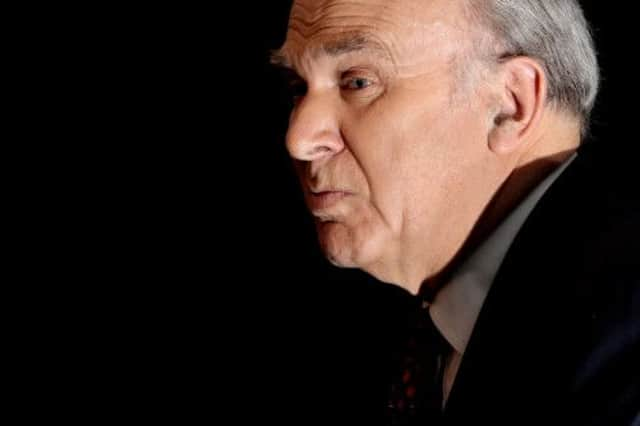Cable warns of getting distracted from issue of economy


Forty years ago, long before his switch to the Lib Dems, before the appearance on Strictly Come Dancing, he was a Labour councillor for the Maryhill district in Glasgow. Scotland has changed a little since then.
Specifically, the independence referendum is taking centre stage. It was to launch the latest UK government paper on that subject that prompted the 70-year-old to head back to his former stamping ground last week. As far as Cable is concerned, the debate is “a distraction” from the main event – the subject that has dominated his political life for the last decade: the financial malaise afflicting the UK.
Advertisement
Hide AdAdvertisement
Hide AdCable does not mince his words on the task the country still faces. “One shouldn’t underestimate the damage that has been done by this financial crisis. It is massive. It has affected all parts of the UK. And it will take quite some time to get right,” he said.
He is speaking in the week that the UK government’s most senior civil servant, Sir Jeremy Heywood, told a conference in London that it could be two decades before normality resumes. “I think that was putting it at the extreme end but the idea that the economy will be back to normal by the end of this parliament is wishful thinking,” Cable said.
“Part of our problem with the Labour party is that they thought by the end of the 2010 the economy was back to normal and any slowdown was the fault of the government. That completely misunderstands the depth of the problem and the long-term damage to the banking system.
“I would be putting it at a decade rather than two decades. Obviously we are moving out of recession but some of the damage in the financial sector is a long-term problem.”
Neither the Scottish referendum nor Prime Minister David Cameron’s plans for a UK wide referendum on EU membership will help to tackle that problem, he claims. He says there are similarities in both proposed referenda; both pose questions about the cost of breaking up a single market, both tap into the “politics of identity”; and both raise the issue of uncertainty, he claimed “If you were an investor in Japan or China and you are wanting to invest in the UK and bring jobs to Scotland or parts of the UK, you are going to ask serious questions. Where is this country going to be in two years’ time and can we rely on there being a single market?” Doesn’t Cameron’s explicit backing for an EU referendum only add uncertainty to the case for the UK, though, making it harder to argue that Scotland should stay in? “It would be easier if we were just dealing with one or the other,” he declared tactfully.
The warnings of uncertainty over the referendum will no doubt provoke further claims of “scare-mongering”. They come after Cable’s paper on independence last week was criticised for raising questions of whether, for example, roaming charges could apply to mobile phone users after independence. He insists that the paper was written carefully and with nuance. “There seems to be a view that whenever you point out the costs rather than the benefits then you are scare-mongering. We do need a grown-up debate.” The fact that the SNP hit back so hard against his claims “may indicate that they are getting a little bit rattled”.
But what of the future if Scotland does vote No? Can a future Scottish Government look forward to a UK administration keen and willing to hand it more power? “We want the issue of independence to be resolved before thinking about further devolution,” he replied. Specifically, what about the idea of devolving corporation tax, as is being demanded in Northern Ireland? Cable does not sound enthused by the idea of having Scotland undercut the UK’s rate. And besides, he adds: “The UK will have by far the most competitive corporation tax rate among the major countries.” The UK is also offering tax relief to firms as well in Scotland, he adds, to help research and development. “If you are trying to offer a separate more attractive bid it would have to do all of those things and that is very costly. How are you going to pay for that?”
More pressing issues are focussing his attention, such as the need to push more bank lending into the economy – with RBS in his sights. Under chief executive Stephen Hester, who will depart later this year, he claims that lending to small firms “had clearly not been the focus of attention”.
Advertisement
Hide AdAdvertisement
Hide AdHe is “massively frustrated” with the bank, he added. “They now say they have found £20bn down the back of the sofa and you just wonder what’s being going on. This is a publicly owned bank… over and over again we get back from companies that you can’t engage with RBS, not interested in small loans to SMEs, not interested in relatively high-risk activity like exporting and manufacturing.”
A public-owned company not acting in the public interest? “That is correct in respect of SME lending. They certainly haven’t been acting in the public interest.”
As ever, Vince doesn’t mince his words.